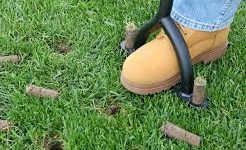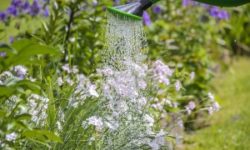MPAC’s Executive Director Ruth Kerzee discusses how to build a strong and healthy lawn from start to finish. A beautiful lawn is like cultivating a new idea. It takes the right ingredients, maintenance, and time. To start, you need a solid foundation of facts and information before elevating the glimmer of an idea into action.
News
I Spy Green! Seven Kane County retailers eco-label lawn care products this growing season.
The blooming of forsythia shrubs and the sprouting of tree leafs signals the beginning of the lawn care season and the many critical decisions to grow strong, resilient grass this spring. This year, seven retailers in Kane County alleviate the anxiety lawn care may bring by eco-labeling effective organic and natural lawn care products and tools.
Protect Your Pets From Dangerous Lawn Chemicals
The adverse health effects of pesticides don’t just harm humans. Avid pet enthusiast and writer Jenny Holt explores ways to protect your furry friends from risky lawn care products. Marie Donovan came home from work one day to find her dog acting lethargic and uncoordinated. His refusal of his favorite treats especially worried Marie. Not sure
Fighting Enemies, Cultivating Active Educators in 2017
MPAC’s Ryan Anderson calls for an all-hands-on-deck effort to eliminate pesticide misuse in 2017. The MGG Forum’s active education approach builds the foundation. 2017 started with the worst possible news for us. On January 2nd in Amarillo, Texas four children died in their trailer home from the misuse of the toxic pesticide Aluminum phosphide. The
Overflow Action 101: How to Stop Flooding and Protect the Chicago River
Stormwater and water used on your lawns and in your house flow into the same pipes. Which can cause problems during periods of heavy rain says our partners at Friends of the Chicago River. Here’s how to address the issue. When watering your lawn, do you ever wonder where it ends up? Chicago and many older suburbs use
Top Ten Reasons Not to Poison Your Lawn
Jean-Marie Kauth, PhD, Associate Professor at Benedictine University, runs down the environmental and health concerns of synthetic lawn pesticides. Dandelions are pretty and edible Dandelions are good food for bees, which are struggling. Pesticides are harmful to wildlife, particularly amphibians. Lawn chemicals are expensive and consume fossil fuels. Pesticides have been shown to cross the placenta
Prepare your roots for a healthy new year!
October is your last and most important chance to feed your lawn and ready it for next spring. Make it count! Says Shay Lunseth, co-founder of Organic Lawns by LUNSETH in Minneapolis. Fall introduces new beginnings. A new school year where we take in knowledge to grow our minds and prepare for a bright future. Fall, also,
Tough Mudder
Things starting to get tight below the green? Grass roots struggling? Time to aerate! Says Metcalf intern Leah Garner. Below the ground a worm struggles, trapped in the layers of tightly packed organic matter and soil of your lawn. Each new footstep smashes in an opening where the worm can execute its day to day
Satisfying Demand, Reducing Supply: Caring for Grass in a Water-Stressed World
The US residential sector uses more than nine billion gallons of water per day on landscapes and turf grass. MGG’s Ryan Anderson investigates options to quench your lawn’s thirst while saving our earth’s most important natural resource. Welcome to August, summer’s victory tour following its peak in July. High temperatures and uncertain rain patterns causes
MGG’s 7th Pesticide-free Park
In cooperation with the Elmhurst Park District (EPD) and Elmhurst Cool Cities Coalition, Midwest Pesticide Action Center (MPAC) and its Midwest Grows Green (MGG) initiative succeeded again in creating safer and healthier outdoor spaces for children, pets, and wildlife, this time by establishing a test site for pesticide-free lawn maintenance at the 2.9 acre Van










